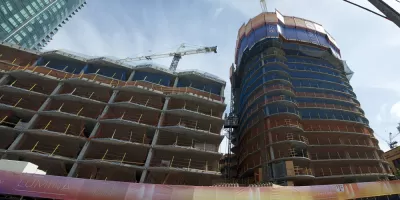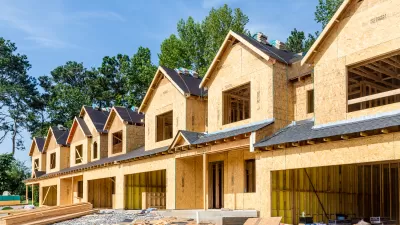Two new reports, and one older one, assign unequal significance of the ability of new market rate housing to filter older housing into affordability.

Darwin BonGraham reports: "According to a new report [pdf] by UC Berkeley researchers, the best way to prevent gentrification and displacement is to build affordable housing in cities and neighborhoods where rents and home prices are rising fastest."
"The Berkeley report is a rebuttal to an earlier, widely circulated report by the state Legislative Analyst Office [sic] that claimed the best way to prevent displacement of low-income households is to simply build more market rate housing as fast as possible," adds BondGraham. (Planetizen was one of the media outlets to circulate news of the LAO's report.)
The article includes specific details on how the new report from Berkeley researchers Miriam Zuk and Karen Chapple responds to the earlier LAO study. Among the claims made by the Berkeley study: although filtering (i.e., as new market rate units become available, older units become more affordable) does occur, the process takes longer than the LAO report acknowledges.
Just a few days after the release of the Berkeley study, the Oregon Office of Economic Analysis released the findings of an examination of filtering, writing in seeming agreement with that point. "The key is that filtering does not happen overnight. It is very much a longer run process," reads a post by Josh Lehner. However, the Oregon Office of Economic Analysis report concludes: "Filtering is also one of the major ways to provide reasonably priced workforce housing for those making in or around the median family income."
The rebuttal process also allows the Berkeley study to reach an important conclusion, as quoted directly from the study: "The development of market-rate housing may not be the most effective tool to prevent the displacement of low-income residents from their neighborhoods, nor to increase affordability at the neighborhood scale," and "to help stabilize existing communities we need to look beyond housing development alone to strategies that protect tenants and help them stay in their homes."
FULL STORY: UC Berkeley Report: Affordable Housing is Best Way to Combat Gentrifcation

Maui's Vacation Rental Debate Turns Ugly
Verbal attacks, misinformation campaigns and fistfights plague a high-stakes debate to convert thousands of vacation rentals into long-term housing.

Planetizen Federal Action Tracker
A weekly monitor of how Trump’s orders and actions are impacting planners and planning in America.

In Urban Planning, AI Prompting Could be the New Design Thinking
Creativity has long been key to great urban design. What if we see AI as our new creative partner?

King County Supportive Housing Program Offers Hope for Unhoused Residents
The county is taking a ‘Housing First’ approach that prioritizes getting people into housing, then offering wraparound supportive services.

Researchers Use AI to Get Clearer Picture of US Housing
Analysts are using artificial intelligence to supercharge their research by allowing them to comb through data faster. Though these AI tools can be error prone, they save time and housing researchers are optimistic about the future.

Making Shared Micromobility More Inclusive
Cities and shared mobility system operators can do more to include people with disabilities in planning and operations, per a new report.
Urban Design for Planners 1: Software Tools
This six-course series explores essential urban design concepts using open source software and equips planners with the tools they need to participate fully in the urban design process.
Planning for Universal Design
Learn the tools for implementing Universal Design in planning regulations.
planning NEXT
Appalachian Highlands Housing Partners
Mpact (founded as Rail~Volution)
City of Camden Redevelopment Agency
City of Astoria
City of Portland
City of Laramie





























